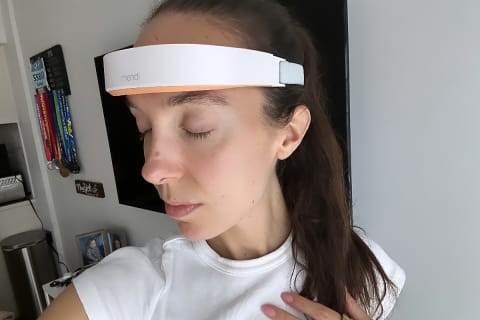
Our editors have independently chosen the products listed on this page. If you purchase something mentioned in this article, we may earn a small commission.
September 9, 2021 — 11:03 AM
I’m a real believer in the power of exercise to change the brain. My studies show that physical activity improves attention and offsets anxiety.
How exercise affects attention & focus.
Even a single bout of exercise can improve attention and executive performance on a Stroop task. In this task known to all students of psychology, you are asked to name the color that the text is printed in for a series of words. The trick is that all the words name different colors (e.g., red, green, yellow). When the word color (red) matches the color of the text (i.e., it’s printed in red text), it’s easy and we name the color of the text very quickly. But if the word color (yellow) is printed in green text, we take much longer to say green.
The ability to ignore the word and focus on the color is called “selective attention” and is dependent on the prefrontal cortex. Performance on this task improves after a single exercise session, and long-term changes in your exercise regimen can cause long-lasting improvements in performance of this task as well.
How exercise affects mood & anxiety.
Unlock All mbg Classes

Ask anyone who is a regular exerciser and they are likely to report how they not only notice an improved overall mood and higher levels of energy post-workout but feel more focused as well. I know that after a workout session (which I now do exclusively in the mornings), I maximize my focus for writing or for tackling the most challenging items on my to-do list. I always feel better prepared to dig into whatever project is “on deck” after I’ve gotten my morning workout in.
Exercise improves many aspects of brain functioning. Like meditation, regular aerobic exercise has powerful positive effects on anxiety and depression, with one study showing that exercise can be as effective as one of the most popular antidepressants in treating major depressive disorder. Exercise has been shown to reduce the symptoms of anxiety disorders and address the underlying neural functioning. One study reported that three months of increased aerobic exercise in older adults resulted in an increased volume of white matter, the output structure of the brain cells that convey information to the downstream cells. While the precise mechanism for how prefrontal function improves and white matter volume increases has not been completely worked out, the increase in concentration of a whole range of growth factors in the brain is likely part of the answer.
All you need is 10 minutes of movement.
On a practical note, because even one exercise session (especially one lasting at least 30 minutes designed to get your heart rate up) has been shown to improve attention/executive function—and anyone even in street clothes can get their heart rate up with a good power walk—physical activity is one of the fastest, easiest, and overall most convenient ways to buffer your own anxiety and boost your focus and attention.
One of the most mind-blowing observations I have made happened almost as a second thought. I was giving a 30-minute live but virtual talk (via Zoom) to a bunch of incoming freshmen at NYU and decided I wanted to make the talk memorable. I asked them all to exercise with me for the last 10 minutes of class so they could truly “feel” the effects of exercise on their mood and cognitive function.
At the last minute, I thought it would be interesting to measure their anxiety levels by having them do a very quick but standardized anxiety test before and after the workout and offer to send them their results after the lecture. I found high levels of anxiety in the group before the exercise but after the exercise a whopping 15-point drop in the anxiety scores, which brought them to normal levels. For me, that shows the power of adding just 10 minutes of movement to your life.
From GOOD ANXIETY by Wendy Suzuki, Ph.D., with Billie Fitzpatrick. Copyright © 2021 by Wendy Suzuki, Ph.D. Reprinted by permission of Atria Books, a Division of Simon & Schuster, Inc.
https://www.mindbodygreen.com/articles/movement-impacts-focus-from-a-neuroscientist









